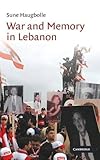War and memory in Lebanon
Material type: TextSeries: Cambridge Middle East studies ; 34.Publication details: New York Cambridge University Press 2010Description: xiii,260p. ill. ; 24 cmISBN:
TextSeries: Cambridge Middle East studies ; 34.Publication details: New York Cambridge University Press 2010Description: xiii,260p. ill. ; 24 cmISBN: - 9780521199025
- 956.92044 22 HA-W
- DS87.5 .H384 2010
 Print
Print
| Item type | Home library | Collection | Call number | Status | Date due | Barcode | |
|---|---|---|---|---|---|---|---|
 Print
Print
|
OPJGU Sonepat- Campus Main Library | General Books | 956.92044 HA-W (Browse shelf(Opens below)) | Available | 112639 |
Browsing OPJGU Sonepat- Campus shelves, Collection: General Books Close shelf browser (Hides shelf browser)

|

|

|

|

|

|

|
||
| 956.9204 NA-L Lebanon the politics of a penetrated society | 956.92044 AC-T Thirty three day war Israel`s war on Hezbollah in Lebanon and its consequences | 956.92044 FI-P Pity the nation Lebanon at war | 956.92044 HA-W War and memory in Lebanon | 956.92044 LE- Lessons in post war reconstruction case studies from Lebanon in the aftermath of the 2006 war | 956.92044 RO-P Palestinians in Lebanon refugees living with long-term displacement | 956.92044 WE-S Syrian intervention in Lebanon the 1975-76 civil war |
Includes bibliographical references (p. 239-253) and index.
Prologue: A hiatus of history -- Remembering a war of selves and others -- Culture, politics, civil war -- Discourses on amnesia and reconstruction : memory in the 1990s -- Nostalgias -- Inside violence -- Sectarian memory cultures -- Truth telling in the Independence Intifada.
"From 1975 to 1990, Lebanon endured one of the most protracted and bloody civil wars of the twentieth century. Sune Haugbolle's timely and often poignant book chronicles the battle over ideas that emerged from the wreckage of that war. While the Lebanese state encouraged forgetfulness and political parties created sectarian interpretations of the war through cults of dead leaders, intellectuals and activists--inspired by the example of truth and reconciliation movements in different parts of the world--advanced the idea that confronting and remembering the war was necessary for political and cultural renewal. Through an analysis of different cultural productions--media, art, literature, film, posters, and architecture--the author shows how the recollection and reconstruction of political and sectarian violence that took place during the war have helped in Lebanon's healing process. He also shows how a willingness to confront the past influenced the popular uprising in Lebanon after the assassination of Prime Minister Rafiq Hariri"--Provided by publisher.
There are no comments on this title.

